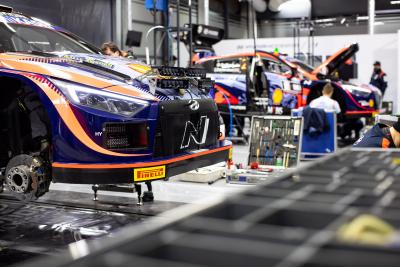Rule changes ratified for 2023 World Rally Championship
Most of these have a cost- or carbon-cutting motive behind them as FIA officials and World Rally Championship promoters aim to clean up the competition’s image and make it more affordable at a time when the car industry continues to experience the aftershock of the COVID pandemic.
Among the adaptions ratified be WMSC members include the number of team personnel that are allowed to enter Tyre Fitting Zones on each of the 13 rounds in 2023.
Labelled a “precautionary step” for 2022, four people from each team could be nominated in case they experienced issues with the new cars’ energy recovery systems as part of the sport’s move to greener technologies. However, this is being halved from Rallye Monte-Carlo come January.
And while all Priority One (P1) crews must continue to complete three runs of the shakedown stage, the provision of four additional tyres is being scrapped “to make the WRC more sustainable”.
WMSC delegates also agreed to abolish morning service on snow and gravel events, starting from February’s Rally Sweden. Flexi-service is also being pared back to just two hours, the FIA’s Rally Director Andrew Wheatley confirmed.
“By removing the morning service on gravel events and trimming the flexi-service window for P1 cars, we can reduce the working day by up to three hours, which will benefit team members but also the many volunteer officials, including scrutineers and service park marshals,” explained Wheatley.
Arguably the biggest change for the sport - which enters the second year using hybrid ‘Rally1’ rules - is to reduce pre-event test days from the current allocation of 28 to just 21.
Agreed by all three World Rally Championship squads, the reason cited by the WMSC is to align the competition with the FIA’s “sustainability push”.
“With the hybrid-based Rally1 cars having competed for a full season and undergone a significant amount of development, the Hyundai, M-Sport and Toyota factory teams agreed to the proposal to cut testing as part of the on-going [cost] reductions,” the FIA stated in its official communication.
Rule tweaks aside, Wheatley says he believes the success of 2022 and the headline-grabbing performance of Kalle Rovanpera – the sport’s youngest champion aged just 22 – gives the World Rally Championship’s decision makers momentum to build on.
“There are some really exciting concepts we are working on in the WRC for next year to reignite the passion of the next generation of drivers,” said Wheatley.
“Kalle Rovanperä has been an amazing role model for young drivers looking at the WRC for the future, but we need to use that momentum to engage the next generation of potential competitors”.
He added: “FIA Rally Star is a great positive step in that direction, and already it is clear that we will have some really talented ambassadors from around the world but it’s not the only opportunity and we are working with our colleagues in the ASNs (National Sporting Authorities) to create some new opportunities that will feed the next generation of competitors.”










